Chinese Journal of Tissue Engineering Research ›› 2016, Vol. 20 ›› Issue (33): 4890-4898.doi: 10.3969/j.issn.2095-4344.2016.33.004
Previous Articles Next Articles
Shengjiyuhong ointment inhibits hypertrophic scar formation
Sun Gui-fang1, Zhang Xiao-fen1, Li Hong-chang1, Pan Li-yun1, Chen Ya-feng1, Xu Ke2, Feng Dian-xu1
- 1Department of General Surgery, 2Central Laboratory, Shanghai Putuo District Central Hospital, Shanghai 200062, China
-
Received:2016-05-28Online:2016-08-12Published:2016-08-12 -
Contact:Feng Dian-xu, M.D., Professor, Chief physician, Doctoral supervisor, Department of General Surgery, Shanghai Putuo District Central Hospital, Shanghai 200062, China -
About author:Sun Gui-fang, Studying for doctorate, Department of General Surgery, Shanghai Putuo District Central Hospital, Shanghai 200062, China -
Supported by:the Fund for Creative Research Groups of Shanghai University of Traditional Chinese Medicine, China, No. B-X-75; the Foundation for High-level Talents in Shanghai Putuo District, China, No. PT 2014-A-24
CLC Number:
Cite this article
Sun Gui-fang, Zhang Xiao-fen, Li Hong-chang, Pan Li-yun, Chen Ya-feng, Xu Ke, Feng Dian-xu. Shengjiyuhong ointment inhibits hypertrophic scar formation[J]. Chinese Journal of Tissue Engineering Research, 2016, 20(33): 4890-4898.
share this article
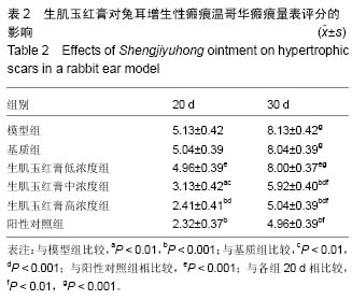
2.1 实验动物数量分析 实验选用白兔36只,分为6组,实验过程无脱失,全部进入结果分析。 2.2 对瘢痕的温哥华瘢痕量表评分的影响 同一组内,与20 d相比较,各组30 d温哥华瘢痕量表评分均显著升高(P < 0.01)。同一时间内,与模型组相比较,基质组和低浓度组均无显著差异(P > 0.05),中、高浓度组和阳性对照组均显著降低(P < 0.01,P < 0.001);与基质组比较,生肌玉红膏低浓度组无显著变化(20 d:P=0.885,30 d:P=0.940),中、高浓度组及阳性对照组均显著降低(P < 0.01,P < 0.001);生肌玉红膏各浓度组相比较,温哥华瘢痕量表评分随浓度升高逐渐降低,中、高浓度组均较低浓度组(P < 0.01,P < 0.001),但中、高浓度组相比较无显著差异(20 d:P=0.083,30 d:P=0.118);与阳性对照组相比较,生肌玉红膏低浓度组显著升高(P < 0.001),中、高浓度组均无显著差异(20 d:中浓度P=0.061,高浓度组P=0.885;30 d:中浓度组P=0.087,高浓度组P=0.881)。表明生肌玉红膏低浓度组无效,中、高浓度组和阳性对照组均具有显著的改善温哥华瘢痕量表评分疗效,中、高浓度组无显著差异,且与阳性对照组无显著差异,见表2。"
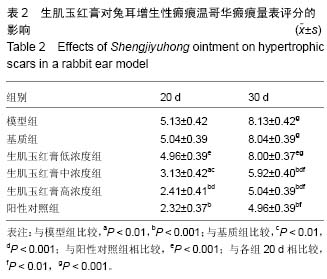
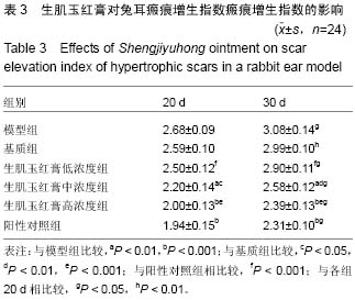
2.3 对兔耳瘢痕增生的影响 2.3.1 对瘢痕增生指数的影响 同一组内,30 d与20 d相比较,各组瘢痕增生指数均显著升高(P < 0.05,P < 0.01),表明兔耳瘢痕在30 d内处于增生期,生肌玉红膏对时间延长引起的增生无影响。同一时间内,与模型组相比较,基质组和低浓度组均无显著差异(20 d:基质组P=0.526,低浓度组P=0.241;30 d:基质组P=0.566,低浓度组P=0.243),中、高浓度组和阳性对照组均显著降低(P < 0.01,P < 0.001);与基质组比较,生肌玉红膏低浓度组无显著变化(20 d:P=0.589,30 d:P=0.551),中、高浓度组显著降低(P < 0.05,P < 0.01,P < 0.001);生肌玉红膏各浓度组相比较,瘢痕增生指数随浓度升高逐渐降低,中、高浓度组均较低浓度组显著降低(P < 0.05,P < 0.01),但中、高浓度组相比较无显著差异(20 d:P=0.187,30 d:P=0.195);与阳性对照组相比较,低浓度组显著升高(P < 0.001),中、高浓度组均无显著差异(20 d:中浓度组P=0.082,高浓度组P=0.670;30 d:中浓度组P=0.073,高浓度组P=0.614)。表明生肌玉红膏低浓度组无效,中、高浓度组和阳性对照组均具有显著的改善瘢痕增生指数疗效,中、高浓度组无显著差异,且与阳性对照组无显著差异,见表3。"
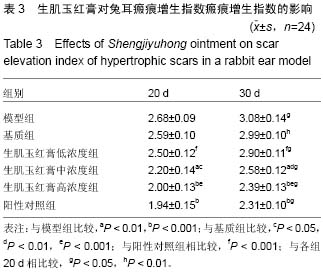
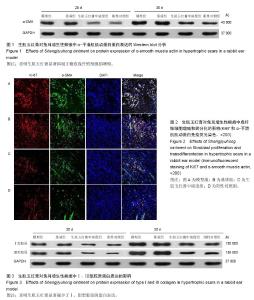
2.3.2 对瘢痕肌成纤维细胞增殖和转分化的影响 同一组内,与20 d相比较,各组α-平滑肌肌动蛋白的mRNA表达30 d均显著升高(P < 0.001),模型组、基质组和中浓度组30 d的α-平滑肌肌动蛋白蛋白表达亦显著升高(P < 0.01,P < 0.001),而阳性对照组无显著差异(P=0.051)。同一时间内,与模型组比较,基质组mRNA和蛋白表达无显著下降(mRNA 20 d:P=0.094,30 d:P=0.085;蛋白20 d:P=0.859,30 d:P=0.727),中浓度组和阳性对照组的α-平滑肌肌动蛋白蛋白表达均显著下降(P < 0.05,P < 0.01,P < 0.001);与基质组相比,中浓度组亦显著下降(P < 0.05,P < 0.01,P < 0.001);与阳性对照组比较,中浓度组无显著差异 (mRNA:20 d:P=0.220,30 d:P=0.337;蛋白:20 d:P=0.572,30 d:P=0.229),表明生肌玉红膏显著抑制 "
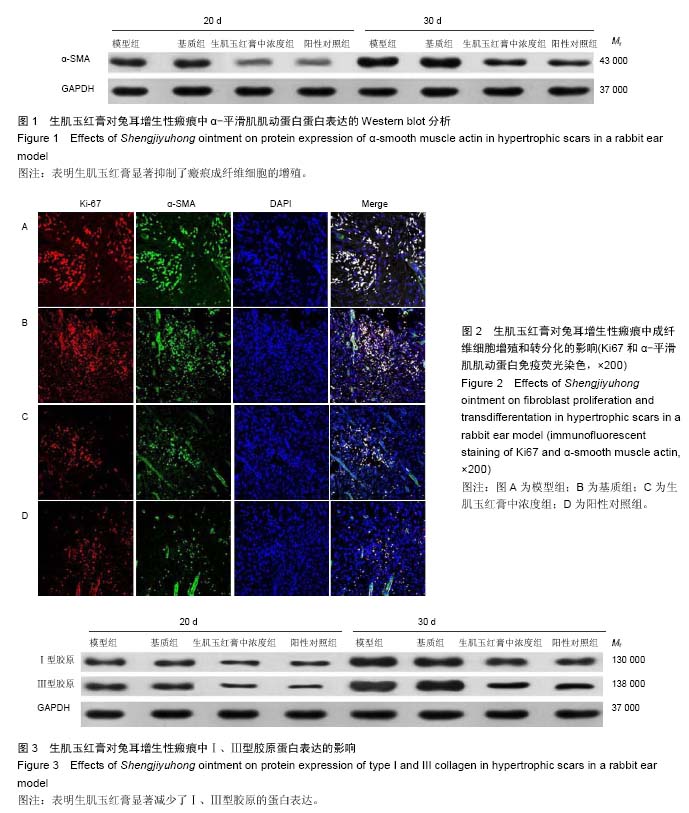
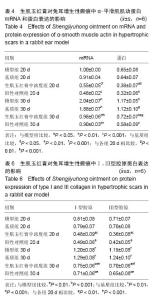
了瘢痕成纤维细胞的增殖,见图1、表4和图2。 2.4 对细胞外基质沉积的影响 2.4.1 对细胞外基质mRNA表达的影响 生肌玉红膏显著减少了细胞外基质的mRNA表达。同一组内,与20 d相比较,各组30 d细胞外基质的 mRNA表达均显著升高(P < 0.01,P < 0.001),表明兔耳瘢痕于30 d内处于增生期,细胞外基质沉积增多,生肌玉红膏和贝复济对时间延长引起的细胞外基质沉积增多均无效。同一时间内,与模型组相比,基质组无显著变化(Ⅰ型胶原20 d: P,30 d:P =0.193; Ⅲ型胶原20 d:P=0.240, 30 d:P=0.427;结缔组织生长因子20 d:P=0.544,30 d:P=0.120;纤连蛋白20 d:P=0.076,30 d:P= =0.225"

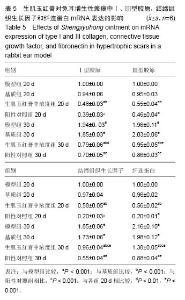
0.154),中浓度组和阳性对照组20 d和30 d均极显著地降低了Ⅰ、Ⅲ型胶原,结缔组织生长因子和纤连蛋白的mRNA表达(P < 0.001)。与基质组相比,中浓度组20 d和30 d均显著下调了Ⅰ、Ⅲ型胶原,结缔组织生长因子和纤连蛋白的mRNA表达(P<0.001)。与阳性对照组相比,中浓度组20 d和30 d Ⅰ、Ⅲ型胶原的mRNA表达无显著差异(Ⅰ型胶原20 d:P=0.160,30 d:P=0.201; Ⅲ型胶原20 d:P=0.055,30 d:P=0.343),但结缔组织生长因子和纤连蛋白的mRNA表达均极显著升高(P < 0.001),见表5。 2.4.2 对胶原蛋白表达的影响 同一组内,与20 d相比较,各组30 d胶原蛋白表达均显著升高(P < 0.05,P < 0.01),表明兔耳瘢痕于30 d内处于增生期,生肌玉红膏"

| [1] Fearmonti R, Bond J, Erdmann D, et al. A review of scar scales and scar measuring devices.Eplasty. 2010; 21;10:e43. [2] Zhu Z, Ding J, Shankowsky HA, et al. The molecular mechanism of hypertrophic scar.J Cell Commun Signal. 2013;7(4): 239-252. [3] Li B, Wang JH-C.Fibroblasts and myofibroblasts in wound healing: Force generation and measurement. J Tissue Viability. 2011; 20(4):108-120. [4] Sarrazy V, Billet F, Micallef L, et al.Mechanisms of pathological scarring: role of myofibroblasts and current developments.Wound Repair Regen. 2011; 19(s1): s10-s15. [5] Hinz B,Phan SH,Thannickal VJ,et al.Recent developments in myofibroblast biology: paradigms for connective tissue remodeling.The American journal of pathology.2012;180(4): 1340-1355. [6] Hinz B, Phan SH, Thannickal VJ, et al. The myofibroblast: one function, multiple origins.Am J Pathol. 2007;170(6):1807-1816. [7] Wang YW, Liou NH, Cherng JH,et al.siRNA-Targeting Transforming Growth Factor-β Type I Receptor Reduces Wound Scarring and Extracellular Matrix Deposition of Scar Tissue.J Invest Dermatol. 2014; 134(7):2016-2025. [8] Arno AI, Gauglitz GG, Barret JP, et al. Up-to-date approach to manage keloids and hypertrophic scars: A useful guide.Burns.2014;40(7): 1255-1266. [9] 安凤敏.生肌玉红膏修复压疮减少瘢痕形成39例报告[J].中国临床康复, 2002,6(4): 546. [10] 缪雪华,张宇轩,陈运,等.生肌玉红胶原海绵促进胶原合成与组织愈合的研究[J].南京中医药大学学报, 2012,28(4): 337-341. [11] 周勇.生肌玉红膏促进慢性下肢溃疡创面肉芽生长临床与实验研究[D]: 南京中医药大学, 2012. [12] 赵春霖,王丽娟,董小鹏,等.生肌玉红膏对深Ⅱ度烧伤大鼠创面愈合过程中Ⅰ, Ⅲ 型胶原表达变化的影响[J].中国中医药科技, 2013,20(5): 467-468. [13] 张艳, 荆玉洁.生肌玉红膏保守治疗腹切口不完全裂开的疗效[J].中国实用医药, 2015,10(23): 177-178. [14] 杨志光.复元活血汤联合生肌玉红膏治疗糖尿病足的临床观察[J].陕西中医, 2015,36(9): 1176-1177. [15] 杨澔侠,高卫卫,姚昶,等.生肌玉红膏胶原海绵对创面胶原塑形的影响及机制[J]. 山东医药, 2011,51(31): 10-12. [16] 曹东阳,姚昶,陈德轩,等.皮下植入生肌玉红胶原后的血管新生与瘢痕抑制[J].中国组织工程研究, 2013,17(34): 6144-6151. [17] 张雪.六物消瘢膏治疗皮肤病理性瘢痕的临床观察及实验研究[D]:山东中医药大学, 2014. [18] 刘凯,张选奋,张瑾,等.当归挥发油对增生性瘢痕成纤维细胞增殖,凋亡及胶原合成的影响[J].中国美容医学, 2012, 21(9):1536-1538. [19] 彭旦明,蔡紫光,张瑾楠,等.紫草素对增生性瘢痕中 VEGF亚型mRNA表达的影响[J].实用中西医结合临床, 2010(2):1-2. [20] 彭旦明,汪华,刘雯,等.紫草色素对兔耳增生性瘢痕的影响[J].四川中医,2011,29(4): 54-58. [21] 李靖,张飞,陈曦,等.紫草油提取物对小鼠瘢痕的抑制作用[J].中西医结合研究, 2009,1(2): 72-74. [22] Bai X, He T, Liu J, et al. Loureirin B inhibits fibroblast proliferation and extracellular matrix deposition in hypertrophic scar via TGF-beta/Smad pathway. Exp Dermatol.2015;24(5): 355-360. [23] 赵丽,周晓宏,关洪全.黑布药膏对兔耳增生性瘢痕胶原合成与降解的影响[J].中国实验方剂学杂志, 2011,17(14): 215-218. [24] Morris D, Wu L, Zhao L, et al. Acute and chronic animal models for excessive dermal scarring: quantitative studies. Plast Reconstr Surg. 1997;100(3): 674-681. [25] Shi HX, Lin C, Lin BB, et al. The anti-scar effects of basic fibroblast growth factor on the wound repair in vitro and in vivo. PLoS One. 2013;8(4): e59966. [26] Kendall RT, Feghali-Bostwick CA. Fibroblasts in fibrosis: novel roles and mediators. Front Pharmacol. 2014;5:123-135. [27] Van De Water L, Varney S, Tomasek JJ. Mechanoregulation of the myofibroblast in wound contraction, scarring, and fibrosis: opportunities for new therapeutic intervention. Advances in Wound Care, 2013,2(4): 122-141. [28] 刘德伍,苏子毅.当归对兔耳增生性瘢痕的治疗作用[J]. 中药药理与临床, 1998,14(6): 30-31. [29] 朱桂英,徐斌,蔡景龙.兔耳解剖特点与成功建立增生性瘢痕模型的相关性实验研究[J].中华整形外科杂志, 2008, 24(3):216-219. [30] 邱恒,孙新民,黄雯,等.玉红膏重复给药大鼠体内汞的吸收及蓄积研究[J].中国中药杂志, 2013,38(6): 884-888. [31] Arno AI, Gauglitz GG, Barret JP, et al. New molecular medicine-based scar management strategies.Burns. 2014;40(4):539-551. [32] Leask A,Abraham DJ.TGF-β signaling and the fibrotic response.FASEB J. 2004;18(7):816-827. |
| [1] |
Zhan Long, Meng Nongqin, Nong Juan, Li Xiaofeng, Yang Yuan, Yu Xue.
Protocatechuic acid alleviates degeneration of chondrocytes |
| [2] | Cao Guolong, Tian Faming, Liu Jiayin. Lovastatin combined with insulin effects on fracture healing in rat models of bilateral ovariectomized type 2 diabetic mellitus [J]. Chinese Journal of Tissue Engineering Research, 2020, 24(5): 673-681. |
| [3] | Zhao Xin, Shi Xin, Chen Bei, Cao Yanpeng, Chen Yaowu, Liu Xiaoren, He Yusheng, He Liyun, Li Xiying, Liu Jun. Vacuum sealing drainage enhances wound healing by up-regulating collagen type I/III ratio in rats [J]. Chinese Journal of Tissue Engineering Research, 2020, 24(32): 5122-5127. |
| [4] | Li Qinwen, Liang Jie, Wang Dongmei, Shang Zhenghui. Fibrotic changes in rat dorsal root ganglion following chronic sciatic nerve compression [J]. Chinese Journal of Tissue Engineering Research, 2020, 24(29): 4686-4691. |
| [5] |
Wu Zhen, Ma Wei, Zang Chenghao, Liu Kuangpin, Liu Wei, Liu Jie, Liang Yu, Li Chunyan, Chen Zhiming, Ru Jin, Fan Chuming, Yang Jinwei, Guo Jianhui, Li Liyan.
Protective effect of notoginsenoside R1 on carbon tetrachloride-induced liver fibrosis in rats [J]. Chinese Journal of Tissue Engineering Research, 2020, 24(26): 4213-4217. |
| [6] | Cui Yishuang, Lai Zhenquan, Hu Zhongling, Wang Qian, Zhang Hui, Guo Baowen, Li Qijia. Effect of bone morphogenetic protein-7 combined with porous tantalum on chondrogenic differentiation and function of bone marrow mesenchymal stem cells [J]. Chinese Journal of Tissue Engineering Research, 2020, 24(16): 2478-2484. |
| [7] | Zhou Yanxing1, Peng Xinsheng2, Hou Gan1, Li Jiangbin1, Zhang Hua1, Zhou Zhikun2, Zhou Yanfang3 . Inhibitory effect of capsaicin on fibroblast proliferation and its molecular mechanism [J]. Chinese Journal of Tissue Engineering Research, 2019, 23(7): 1018-1022. |
| [8] | Chen Peng, Shi Xiaotian, Guo Yu, Qiu Xunyong, Wang Yan. Longbie capsule combined with bone marrow mesenchymal stem cell transplantation for knee osteoarthritis [J]. Chinese Journal of Tissue Engineering Research, 2019, 23(5): 797-802. |
| [9] | Lin Xiaomin1, Pan Weibin1, Wu Yuqiong1, Fan Xiao2. Effects of Buyang Huanwu decoction on the expression of collagen type I and IV after spinal cord injury [J]. Chinese Journal of Tissue Engineering Research, 2019, 23(31): 4986-4991. |
| [10] | Yang Xuan, Han Pengfei, Zhou Xin, Lu Jiangong, Wang Shichuan, Wang Yuze. Protective effect of glucose-dependent incretin analogue DAIa2GIP on knee cartilage injury of rats [J]. Chinese Journal of Tissue Engineering Research, 2019, 23(22): 3549-3555. |
| [11] | Lin Xianglong, Gao Lilan, Li Ruixin, Cheng Wei, Zhang Yang, Zhang Chunqiu, Zhang Xizheng. Three-dimensional culture of chondrocytes/3D-printed composite scaffolds under compression loading [J]. Chinese Journal of Tissue Engineering Research, 2019, 23(10): 1483-1488. |
| [12] | Chen Jingjing, Wang Qian, Cui Yishuang, Teng Xuefeng, Zhang Hui, Li Qijia. Effects of domestic porous tantalum on expression of collagen type I, tissue transglutaminase 2 and calcium-binding protein A4 in MG63 cells [J]. Chinese Journal of Tissue Engineering Research, 2019, 23(10): 1546-1551. |
| [13] | Zhai Min, Hu Xiao-gen, Liu Hong-lin, Xu Shi-qing, Wang Zai, Zhang Wen-jian. Effect of 1,25(OH)2D3 on type I collagen secretion in adipose-derived mesenchymal stem cells and its mechanism [J]. Chinese Journal of Tissue Engineering Research, 2018, 22(9): 1370-1375. |
| [14] | Li Ren-bin, Yu Guang-shu, Lin Yan-bin, Zhou Jia-feng, Huang Yi-qi, Zheng Wei. Edaravone effects on the expression levels of collagen type I and IV after spinal cord injury in rats [J]. Chinese Journal of Tissue Engineering Research, 2018, 22(8): 1235-1240. |
| [15] | Jing Ya-jun 1, Zhang Lei1, Zhang Shao-qun1, Liao Li-qing1, Yuan Shi-guo2, Li Yi-kai1. Pathological changes of the skeletal muscle after local loosening therapies [J]. Chinese Journal of Tissue Engineering Research, 2018, 22(4): 535-541. |
| Viewed | ||||||
|
Full text |
|
|||||
|
Abstract |
|
|||||